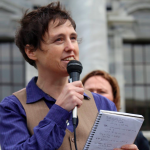A Voice for Progressive Reform: An Interview With Labor MLC Rose Jackson

During her June maiden speech in NSW parliament, newly-incumbent Labor MLC Rose Jackson reminded those gathered that this state was once a world leader in harm reduction, which was exemplified by the establishment of the Uniting Medically Supervised Injecting Centre in Kings Cross.
And she went on to underscore that it’s time for the state to make its way back to the head of the pack and consider legalising cannabis, as has now been done in eleven US states, along with the entire nations of Canada and Uruguay.
Another area where NSW is sadly falling behind is pill testing. Ms Jackson asserted that a trial of this harm reduction approach should take place over the 2019-20 summer festival season, with the obvious aim of saving lives, and the sometimes overlooked consequence of lowering drug use.
Over the last festival season, a record five young Australians died in drug-related circumstances at NSW festivals. And as the death toll rose, NSW premier Gladys Berejiklian refused to trial pill testing, which has been used successfully utilised in European countries since the early 90s.
The rights of women
Ms Jackson also took aim at the patriarchy as she spoke in the upper house. She asserted that men today are still enjoying “advantage and preferment not because they are better or even necessarily any good at all, but because they are men”. And she added it was time for this to stop.
Abortion is another key area Jackson pinpointed is overdue for reform. NSW is the only state that still outlaws the common procedure. Sections 82, 83 and 84 of the Crimes Act 1900 provide that a woman terminating a pregnancy, and those that assist her, are committing crimes.
The Labor MLC began her inaugural speech acknowledging that the laws that provided the NSW government with “the power to steal the children of Aboriginal families” were enacted in the very room where she was speaking.
And indeed, towards the end of last year new forced adoption laws were passed through both houses of parliament, which are set to affect First Nations communities to their detriment once again, and see more children removed from their families permanently.
Far left of centre
Ms Jackson is a staunch unionist and has been a member of the Labor party for over 15 years. And prior to becoming the NSW Labor assistant general secretary in 2016, she worked as the national political coordinator for the United Voice trade union.
Over the few months she’s now held a seat in the NSW Legislative Council, Ms Jackson has moved a motion condemning the AFP press raids, she’s raised concerns over unchecked wealth inequality and she’s also been calling for an end to Sydney’s nightmare lockout laws.
Sydney Criminal Lawyers spoke with Ms Jackson about the benefits legalising cannabis would bring to the community, what she believes the feminist movement should be focusing on at present, and why rising economic inequality needs to be reined in.
Firstly, during your maiden speech in parliament, you called for cannabis legalisation. Currently, there’s a recreational cannabis bill before the ACT parliament that seems likely to passed sometime this year.
Ms Jackson, why is the legalisation of cannabis a priority for you? And if such a bill was introduced into NSW parliament, do you believe it would have majority support?
It’s a priority for me because it’s a no-brainer in a range of significant areas. The current regime just isn’t working and it’s putting significant strain on the criminal justice system in an unnecessary way. That’s a major reason why it has to change.
It’s also an economic opportunity for NSW. And we’ve seen that in other jurisdictions worldwide that have moved to legalise cannabis that the state can play a role in taxing its distribution, as it does with other substances, such as tobacco, and actually earn revenue.
The capacity of the state to regulate that market means that we can ensure the safety of the product, the safety of consumers, and we can wipe out the black market, which will lead to a reduction in crime. It will put a dent in organised crime networks in NSW.
So, there are a range of reasons why it’s an obvious thing we should do. And as I said in my inaugural speech, there’s no reason why alcohol or tobacco should be legal, but cannabis shouldn’t be. There’s absolutely no justification from a policy or evidence point of view for that distinction.
Would it have support? That’s a good question. It would be a stretch, to be honest. We need to do more work demonstrating the obvious benefits of cannabis legalisation and the reasons why the current regime isn’t working. And that’s something I’m prepared to be quite vocal and lead on.
I hope we can get there soon. And I know we will get there eventually. This is something that’s going to happen, so we might as well just get on the right side of history and do it.
Last festival season, five young Australians died at NSW events. However, premier Berejiklian has consistently said there’s a lack of evidence to warrant these services.
In a couple of months this year’s festival season will be upon us again. Considering the high death toll last year, what do you think of the premier’s refusal to trial this method that’s regularly used with success in Europe?
It’s incredibly foolish and disrespectful to young people. She’s wrong about there being no evidence that it saves lives. As you’ve pointed out, there’s international evidence that when pill testing facilities are available young people use them and discard substances that are toxic.
So, there’s clear evidence that it saves lives. And the refusal to even consider it, to even meet with the experts, and to contemplate a medically supervised trial for the festival season coming up, is unbelievably disrespectful to young people and a complete head-in-the-sand approach that leads to more harm.
And it’s an incredible abdication of responsibility from a political leader.
Instead of looking at pill testing last summer, Berejiklian’s kneejerk reaction to the drug-related deaths was to try and shut down the entire festival industry. This was likened to the Coalition’s introduction of the lockout laws in the centre of Sydney.
What sort of effect would you say the lockouts has had on our city? And what do you think should be done about them?
When they were introduced, the lockouts were a good idea. They were necessary at that time in 2014. They’ve had the effect of shutting down some of the gross beer barns that were producing a lot of very intoxicated people and leading to violence on our streets.
So, the fact that we’ve managed to get rid of that is a really good thing. And that’s a consequence of the lockouts.
But, there has been another side to them, which has been the complete trashing of any kind of dynamic, energetic cultural life in Sydney.
We’ve seen dozens and dozens of venues close in the CBD, including a lot of live music venues. This has dried up a lot of employment opportunities for a lot of young people, whether that be in hospitality or as musicians.
None of that was an intended consequence of the lockouts, but that’s what’s happened. And we’ve now reached a point in 2019, where we need to go back to the drawing board, because Sydney’s international reputation is suffering.
And it’s not viable if we want Sydney to be the best city in the world, which it should be. We’ve got a great harbour, great people and a great economy.
But, the lockout regime is really hurting us. So, we’ve got to go back to the drawing board and start again to ensure that we have safe streets and communities and we don’t have drunk people beating up each other, as that’s not acceptable.
But, it’s also not acceptable to completely decimate Sydney’s cultural scene. And the point that you raised initially about the festivals is a good example of the way that heavy-handed regulation is used without thought for unintended consequences.
We had loads of festivals in NSW under serious threat and shutting up shop, which is terrible for our tourist industry. And the government had no consultation with the festival industry. It just rammed these changes through.
It’s just another sign that this government disrespects young people and doesn’t listen to their voices.
You also raised abortion in your speech. NSW is the only state that continues to consider it a crime. Although, women can undergo the procedure without facing prosecution. Considering abortion is accessible in this state, why is it an issue if it remains criminalised?
It’s out of step with community expectations. People don’t think that terminating a pregnancy should be a crime. And therefore, it shouldn’t be in the Crimes Act.
It creates a stigma around the procedure that makes it hard for women, their families, and their doctors to talk openly about termination options. That’s a problem. And it’s completely old-fashioned and out-of-date to have abortion in the Crimes Act.
As you say, women can access termination of pregnancy, but they should be able to do that without even the stigma of the suggestion that it’s a criminal offence. It’s a medical procedure that’s relatively commonplace.
The other problem is that because it’s still a crime there are limited public health options available for termination of pregnancy. You can access the services, but it’s not a normalised part of the public health system, like other medical practices.
That means if you are a poor woman, or you live in a remote community, it’s much more difficult for you to access these services.
And that’s not going to change until we remove it from the Crimes Act, accept that it’s not a crime and that it’s an acceptable decision for a woman to make and integrate it into the public health system, like all other medical procedures.
Late last year, forced adoption laws were passed in this state, which require a decision to be made about whether a child in out-of-home care can be returned to their family within 24 months or they should be adopted out or placed in permanent guardianship.
Child removals in this state disproportionately affect Aboriginal communities. The timeframe entailed in these laws has been criticised for being too brief. And there have been strong calls for these laws to be revoked.
What do you think about the implications of these laws? And do you believe there’s a need for something to be done about them?
There’s a need for something to be done about them, because the implications are that an increasing number of Indigenous young people are going to be disconnected from their family permanently. And that’s a real problem.
There’s concern that those timeframes are too brief. We have to make sure that we have a really strong regime to take care of disadvantaged children and give them certainty and permanency in terms of their family unity.
But, there’s a lot of evidence that disconnecting Indigenous young people from their families and kinship connections is really damaging long-term. And we should be careful about doing that.
The problem with these laws is they make it too easy for that to be done permanently without thinking about the longer-term consequences of that displacement.
So, it should be looked at again and reviewed. And there should be real consideration given to the disproportionate impact this is going to have on Indigenous families and making sure that keeping those family connections strong is given a high priority.
You’re a vocal feminist. In your understanding what needs to be prioritised to address gender inequality at present?
The top priorities are around some of those areas where women’s disadvantage is intersectional with other areas of their disadvantage. So, Indigenous women, women with disabilities and older women.
I have to admit that for women like myself – straight, white, middleclass women – we actually have lots of opportunities now. And feminism has really delivered quite a lot for us. There’s still some work to be done, but if you’re asking me about my top priorities, it’s not that.
It’s the much poorer outcomes that are experienced by disadvantaged women: women living in poverty, older women who can’t find jobs, lesbian women who continue to face particular discrimination and disadvantage.
That’s where the conversation needs to go: to women who aren’t part of the mainstream conversation, which is often dominated by people like me. And that’s a problem.
We need to speak out on behalf of women who don’t find it as easy to have their voices heard, because they’re experiencing particular disadvantage. And that should be the priority for the feminist movement.
And lastly, Ms Jackson, you recently addressed the economic inequality crisis in parliament. You spoke of the top 1 percent in this state receiving the same pay in a fortnight that the bottom 5 percent receive in a whole year.
Again, how do you think this issue needs to be addressed? And if it isn’t, what are the consequences of letting wealth disparity simply increase with no stops?
The consequences are serious. An unequal society is less safe. It’s much less stable. It actually starts to affect economic growth. It is not a prosperous society.
If we keep heading down the track of extreme wealth inequality, we are going to see crime increasing in this state. We will see growth slowing. We are going to see this state become a less happy and healthy place to live. So, the consequences are quite serious.
We’ve seen that throughout history, as societies become more and more unequal, they become less and less pleasant and secure places to live. So, we’ve really got to get on top of the fact that wealth inequality is increasing.
How do we do that? There are no easy answers. Obviously, we need to look at our tax system to make sure particularly big corporations are paying their fair share of tax, so that we have a system that allows us to support people at the bottom end of the spectrum to help them get ahead.
That’s one area we need to look at. And we need to look at the social security system, like Newstart and other payments. I’m not pretending that we can easily make everyone in society equal. That’s not feasible or even necessarily desirable.
But, you’ve got to have a society in which if you are from a poor background, you believe – because it’s true – that if you work hard you will be able to get ahead.
That’s so important for any successful prosperous society: that people say that if I work hard, go to school and put effort in that I will be rewarded. And that’s happening less and less.
So, we need a tax system and social security system that say hard work will be rewarded and we’re going to make sure that there’s at least the opportunity for people on low income and from intergenerational disadvantage to get ahead.
That’s a really important part of what the state parliament needs to do. And as I addressed in parliament, it’s a real shame that there was no acknowledgement of that in the recent state budget.







